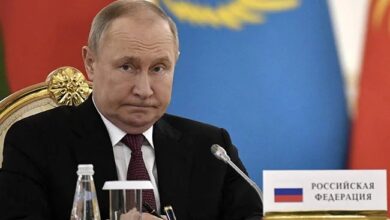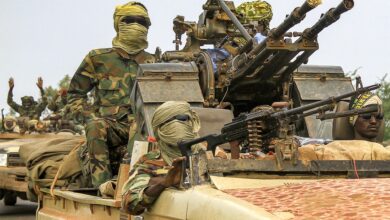Central African President Faustin-Archange Touadera on Wednesday, October 23 asked his Russian counterpart Vladimir Putin to extend military aid and work to overturn an international arms embargo.
The request came at a major summit in the Russian resort city of Sochi, as the Kremlin seeks to revive its influence in Africa.
“Heavy weapons are necessary for us to create effective forces,” Touadera said in a face-to-face meeting with Putin, in which he thanked the Russian leader for earlier military support and training.
“Armed groups get heavy weapons by circumventing the embargo and that is why we cannot control the territory of the whole country,” Touadera said.
Touadera asked Russia to “intervene” on the embargo.
In September, the United Nations Security Council approved the easing of a total arms embargo on the Central African Republic for the first time since 2013. It authorizes the country’s security forces to be supplied with weapons of a calibre of 14.5 mm or less, and the U.N. sanctions committee can also approve supplies of other arms and lethal equipment and related materiel.
The embargo was first lifted in 2017 to allow delivery of Russian light weapons for the country’s Armed Forces (FACa), and has since made a second delivery. Late last year, France handed over 1,400 AK-47 assault rifles and three amphibious vehicles. Belgium, China and the U.S. have all supplied equipment for CAR’s military, but that equipment is understood not to include weaponry.
“The sanctions that were imposed in 2013, when the Central African Republic had no legitimate government, are now targeting the legitimate authorities,” Tass reported Touadera as saying. “Therefore, we ask that the embargo be lifted as it works against the legitimate government.”

Putin described Central African Republic as “a promising partner of Russia on the African continent,” noting that 2020 will mark the 60th anniversary of Russia’s recognition of CAR’s independence and establish diplomatic relations.
He said that Russia “will do everything in order to support your efforts to stabilize the situation in the country, to strengthen mutually beneficial trade, economic and humanitarian ties.”
Putin in recent years has made a string of high-profile moves that strengthened Russia’s influence in the Central African Republic, training troops, brokering peace talks with militias, and providing security and advice to Touadera, sparking tensions with France, the former colonial power.
In August 2018, Russia signed a military cooperation agreement with CAR offering the possibility for Central African officers and NCOs to be trained in Russian military schools.
Controversial Russian private military contractor Wagner is believed to be active in CAR. The group was implicated in the 2018 murders of three Russian journalists who were said to be investigating Wagner’s dealings in the country.
On the economic front, the Russian mining company Lobaye Invest was given a license for several concessions in the CAR, a country rich in gold and diamonds.
A divided country
Despite reserves of diamonds, gold, uranium, copper and iron, Central African Republic remains one of the world’s poorest countries.
Fighting broke out between the Seleka, a coalition of mainly Muslim rebel groups, and the mainly Christian anti-balaka militia in 2012. A peace deal was signed in January 2013, but Seleka rebels captured the capital Bangui that March and ousted President Francois Bozize.
Seleka was officially disbanded within months, but many fighters refused to disarm, becoming known as ex-Seleka. Many others joined the anti-balaka militia to fight the Seleka, leading to a spiral of violence between groups along religious and ethnic lines.
By the end of 2014, CAR was de facto partitioned – anti-balaka in the southwest and ex-Seleka in the northeast.
Elected in 2016, President Faustin-Archange Touadera’s weak government controls around a fifth of the country and relies heavily on the U.N. peacekeeping mission, MINUSCA, for support. The rest is controlled by at least 14 different militia groups who often fight each other for revenue from extortion, roadblocks or mineral resources.
In February, CAR’s government reached a peace agreement with 14 armed groups that led to the formation of a new government that includes representatives of the groups, but sporadic fighting between groups persists.
With reporting from AFP. This post was updated on October 23












